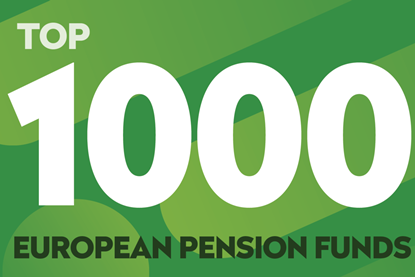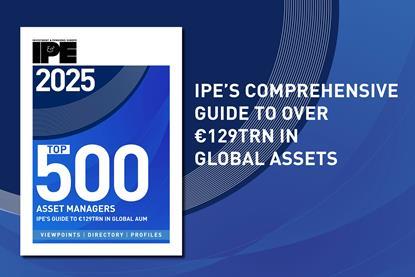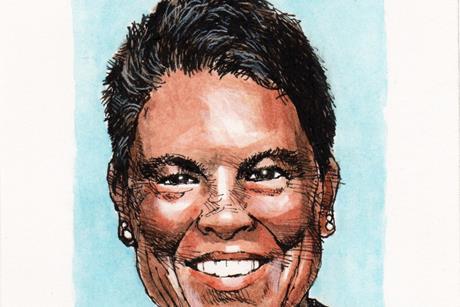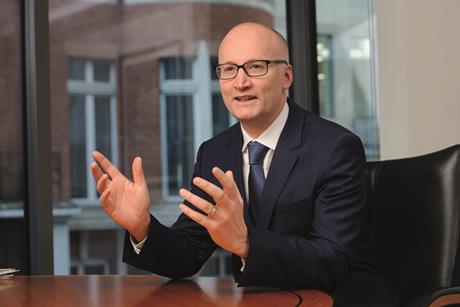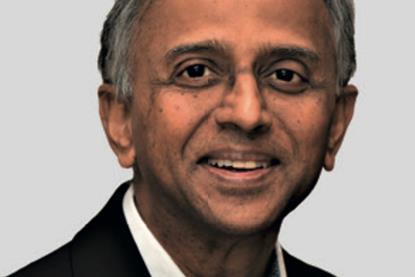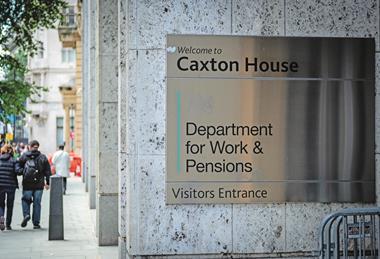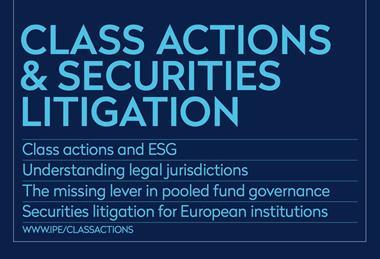- Will Germany's extraordinary spending plan bring benefits for investors?
Top stories
Germany’s VZB claims previous investments were ‘unlawful’
The German pension fund for dentists is attempting to claw back damages against its €1.1bn loss
Sweden’s FTN calls for tenders for €4bn of US, North American equity mandates
In its eighth procurement process, Swedish Fund Selection Agency plans to replace 16 existing fund offerings with just eight
Church of England Pension Board explores collective defined contribution arrangement
The board previously expressed interest in launching a multi-employer CDC scheme back in 2024
Inarcassa turns to alternatives to fast track private markets capital deployment
The fund is targeting a 34% allocation to private markets, compared with 28.2% currently invested
New UK law to clarify class action litigation funding
The move will end uncertainty over whether all third-party litigation funding agreements are currently enforceable
Buyout increasingly perceived as less attractive for large defined benefit schemes
Strong funding and control drive large UK DB pension fund to rethink buyout as the default endgame, says Brightwell
The UK’s ‘deep tech’ sector: a paradox for policymakers and institutional investors
Deep tech now represents 31% of all UK venture funding – a threefold increase from a decade ago
Thoughtful engagement with AI is no longer an option for asset managers and pension funds
The arrival of AI into the investment process has the potential to vastly amplify existing research-related information disparity
Sustainable capitalism should ditch Milton Friedman’s flawed approach
Nobel Prize-winning economist Milton Friedman’s influence on corporate behaviour and investment philosophy continues to resonate decades after his famous 1970 New York Times article declaring that the sole social responsibility of business is to increase profits.
Velliv Foreningen CEO lauds Danish pension system, ponders next step
Over his 40-year career in pensions so far, Lars Wallberg has seen profound changes in Denmark’s pension system
People moves: Railpen names chief risk officer
The UK £34bn railways pension fund has also appointed a chief people officer
People moves: Former Tesco Pension chief joins London CIV
Plus: Industriens Pension has appointed a new legal director; APG has added to its executive board
Buyout increasingly perceived as less attractive for large defined benefit schemes
Strong funding and control drive large UK DB pension fund to rethink buyout as the default endgame, says Brightwell
When net zero targets fail, fix the system, not the frameworks
Frédéric Ducoulombier, programme director at EDHEC Climate Institute, argues that value-chain complexity and Scope 3 uncertainty have become convenient alibis
IPE Netherlands Briefing: Dutch resistance to benchmarking
Plus: Sustainability: funds push ahead despite backlash; Pension risk transfer and the insurance market
Faith-based initiative to link peacebuilding with critical mineral supply chains
The coalition, led by the Church of England Pensions Board, is to use peacebuilding to tackle material risk management for global supply chains worldwide
IPE DACH Briefing: Legal disputes intensify for German professional pension funds
Germany’s VZB and BVK are preparing legal cases to claim investment losses
Velliv Foreningen CEO lauds Danish pension system, ponders next step
Over his 40-year career in pensions so far, Lars Wallberg has seen profound changes in Denmark’s pension system
‘Pension funds are economically interesting creatures with deep social relevance’
The outgoing CEO of Finnish pension fund lobby group TELA speaks to Rachel Fixsen about intellectual challenges, taking difficult advocacy positions and her future plans
Insourcing versus outsourcing: a deceptively simple question
Leading executives at the UK’s NEST Invest, France’s ERAFP and Germany’s Bosch Pensionsfonds spoke to Joseph Mariathasan about operational and asset allocation challenges
CaixaBank’s Blanch: time to move from rhetoric to action
As chair of Pensions Caixa 30, Yolanda Blanch is committed to forging ahead with what she describes as “systematic leadership”
Lazard Asset Management 's Jeremy Taylor: “The shape of the market has completely changed”
Lazard Asset Management makes a strong case for fundamental research and active management, Europe co-CEO Jeremy Taylor tells Carlo Svaluto Moreolo
IPE Magazine January/February 2026
Read the latest issue of IPE Magazine
Browse the digital edition and find highlights from this month's issue below
Digital edition of IPE magazine
January/February Highlights
European equities: IPO market set for rebound amid policy uncertainty
A renaissance in European stockmarket flotations needs to be backed by more supportive policies
Sustainable capitalism should ditch Milton Friedman’s flawed approach
Nobel Prize-winning economist Milton Friedman’s influence on corporate behaviour and investment philosophy continues to resonate decades after his famous 1970 New York Times article declaring that the sole social responsibility of business is to increase profits.
Fiduciary assets plateau as UK market matures
UK pension schemes are de-risking through insurance in growing numbers, while many are choosing run-on strategies – and fiduciary managers must adapt
Insourcing versus outsourcing: a deceptively simple question
Leading executives at the UK’s NEST Invest, France’s ERAFP and Germany’s Bosch Pensionsfonds spoke to Joseph Mariathasan about operational and asset allocation challenges
CaixaBank’s Blanch: time to move from rhetoric to action
As chair of Pensions Caixa 30, Yolanda Blanch is committed to forging ahead with what she describes as “systematic leadership”
Corporate reform underpins Japan’s record equity run
Japanese equities surged to record highs last year, amid confidence that government policy and the new regulatory framework will continue to support investment
Fixed income report 2026 - Germany’s spending spree: safe bet or bumpy ride for Bund investors?
The German government’s landmark decision to increase public spending beyond its traditionally strict limits meant that Bunds had a volatile ride last year. This scenario has already become a familiar one for investors, as shown by the 2.5 basis points (bps) jump in the 10-year bond yield that kickstarted 2026.
- Previous
- Next
- Previous
- Next












